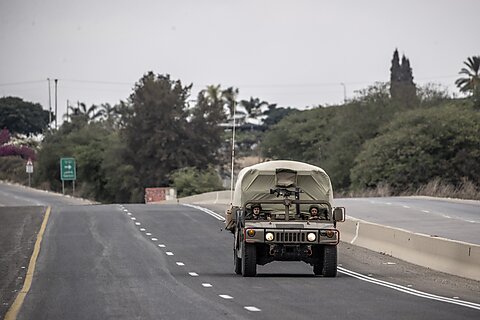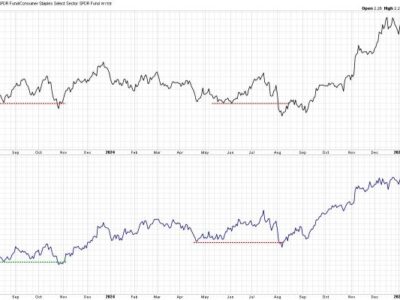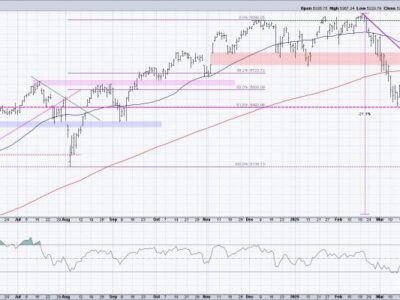
Americans widely condemned Hamas’s terrorist attacks on Israel on October 7 and reacted with justified horror at the unconscionable brutality of the terrorists. The images of murdered civilians, children, and even babies should raise the fury and disgust of all civilized people. However, some American policymakers and commentators used the news of those attacks in Israel to draw unreasonable parallels with US‐Mexico border security. Donald Trump is the most prominent Republican who linked Hamas’s terrorist attack in Israel to US‐Mexico border security, but Nikki Haley, Ron DeSantis, Vivek Ramaswamy, and Kevin McCarthy also responded to Hamas’s attack in Israel by worrying about terrorists crossing the US‐Mexico border like they crossed Israel’s border.
Israel’s problems with border security are vastly different from those faced by the United States on its border with Mexico.
Many of Israel’s borders are aspirational ceasefire lines from numerous wars and conflicts over the last several generations. Rockets, terrorists, warplanes, and soldiers frequently cross Israel’s borders, and the Israeli government retaliates with force. Palestinian cross‐border workers also crossed the border to work in Israel. However, that program is currently suspended and the Israeli government is likely to cancel it entirely, significantly reform it, or limit it to Palestinians from the West Bank.
By contrast, the US‐Mexico border is riven with arms smuggling, drug smuggling, illegal immigration, and the violence that comes with all black market activity. The US federal government, state governments, and the Mexican government sometimes deploy troops to crack down on crime, smuggling, and illegal immigration. But there are no bomb shelters for civilians to defend themselves against frequent rocket attacks, and acts of terrorism or military incursions don’t punctuate a long‐simmering insurgency.
In other words, the US‐Mexico border is standard, while Israel’s borders are anything but. The security situations in both regions are radically different.
For instance, the amount of terrorism in the countries is vastly different. The annual chance of being murdered in a terrorist attack in Israel is about 1 in 108,728 (from 1975 until October 12, 2023). The annual chance of being murdered in a terrorist attack in the United States during that period is about 1 in 3.6 million. The annual chance of being murdered in a terrorist attack in Israel is about 33 times greater than in the United States.
There are other ways to compare. In the United States there were 190 murders for every person killed by a terrorist from 1990–2022. During the same time in Israel there were just under two murders for every person killed by a terrorist (it appears that intentional homicides and murders in terrorist attacks are separated in Israel crime data, but I’m not entirely sure). The American homicide rate was 6.6 per 100,000 during that time, about 3.2 times higher than Israel’s homicide rate of about 2.1 per 100,000.
If the US had the same homicide rate as Israel, there would still be over 56 homicides for each person killed by a terrorist. That’s a vast difference between the two countries.
The above numbers include all terrorists and are not separated by their nationality. The Hamas terrorists unlawfully crossed the border from Gaza to Israel before murdering approximately 1,400 people on October 7 (the numbers will probably rise). Meanwhile, zero Americans have been murdered or injured in terrorist attacks committed by border crossers who entered illegally from 1975–2022, including those who entered through the southwest border.
But that’s not the end of it. Nine foreign‐born terrorists entered the United States illegally during 1975–2022. Three of the nine convicted illegal immigrant terrorists entered illegally by crossing the US‐Mexico border. They are Dritan Duka, Eljvir Duka, and Shain Duka, and they entered illegally in 1984 when they were aged 5, 3, and 1, respectively. They were arrested almost 23 years later, in 2007, while plotting to attack Fort Dix, New Jersey.
The Duka brothers were “got aways,” which is defined as an unlawful border crosser who (1) is directly or indirectly observed making an unlawful entry into the United States; (2) is not apprehended; and (3) is not a turn back. There have been many “got aways” in recent years, likely over 1.2 million in total. Of the other illegal immigrant terrorists, five illegally crossed the US‐Canada border (Walid Kabbani, Darren Thurston, Gazi Ibrahim Abu Mezer, Ahmed Ressam, and Nuradin M. Abdi) and one was a stowaway on a ship (Abdelghani Meskini).
Furthermore, the countries bordering the United States are not a significant source of terrorism. There have been zero terrorists from Mexico who attempted, were convicted of attempting, or committed an attack on US soil since 1975. There were three from Canada during that time who didn’t kill or injure anybody. Including Mexicans and Canadians, there were 24 terrorists from the Western Hemisphere who attempted or committed attacks on US soil since 1975. Twelve were from Cuba, three were from Haiti and Cuba each, two were from the Bahamas and Trinidad and Tobago each, and there was a single terrorist from Honduras and the Dominican Republic each. Together, they murdered seven people in attacks and injured one person.
By comparison, almost all the attacks in Israel come from terrorists who are either Israeli, Palestinian, or from a nearby country, if not from a country directly bordering Israel. There is nothing like a Mexican, Central American, or South American Hamas targeting the United States.
The chance of terrorists crossing the US‐Mexico border and carrying out an attack in the United States is greater than zero—it could happen. Customs and Border Protection should continue to weed out potential security threats to protect Americans’ life, liberty, and property. Still, the chance of such an attack occurring is small if experience is any guide.
It’s so small that Americans must rely on poor measurements like hits on the error‐filled Terrorists Screening Database or whether illegal immigrants are from Muslim countries (known as Special Interest Aliens) to talk about a terrorist threat along the border. Israelis don’t have to rely on poor measurements to proxy the terrorist threat along their borders. They unfortunately have actual terrorism to analyze. For these reasons, US‐Mexico and Israeli border security concerns are distinct, and American commentators irresponsibly conflate them.








